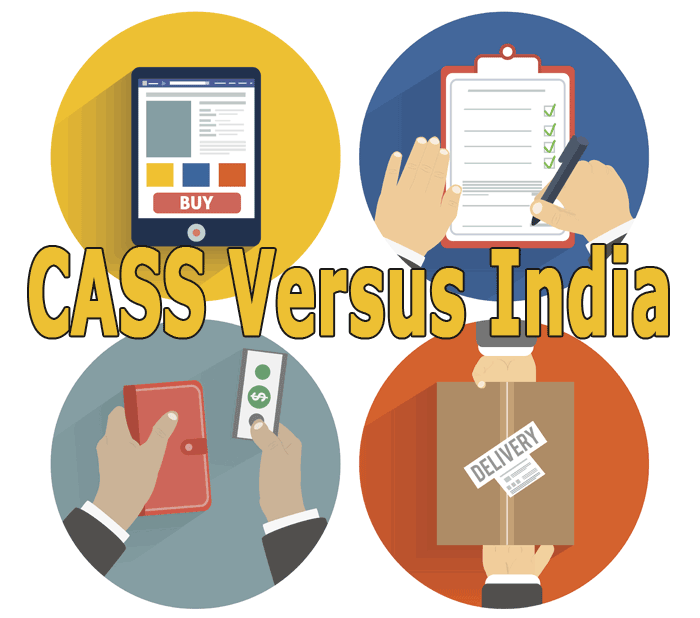CASS Versus India Round 2

The
controversy of IATA’s CASS (Cargo Accounts Settlement System)
in India continues to hold center stage. In a recent move, ACAAI (Air
Cargo Agents Association of India), the apex body representing the air
cargo industry in India, which has not accepted CASS, has once again
gone to the Competition Commission of India (CCI), for what it has termed
as “a clarification.” The need for “clarification”
concerns directives first from Emirates SkyCargo and later from Cathay
Pacific.
The note from Emirates SkyCargo
states that the “CASS Pilot Programme was initiated in India under
IATA Res. 801 from May 16, 2013, and Emirates SkyCargo had also opted
to participate for this new billing and settlement programme. CASS is
an automated billing and settlement system and quite a few of our partner
agents volunteered to participate in the pilot run to be the industry
firsts. We are thankful to them for having shown their initiative to
reap the benefits of efficiency gains, productivity gains and reduction
in operational cost for stakeholders.” [sic]
It goes on to say that “billing
through CASS pilot for export billing is running perfectly well, meeting
all the requirements of our partner freight forwarders and ourselves.
To take this further, Emirates SkyCargo will migrate its current carrier
billing at point of sale branch level to CASS Export Billing at a single
head office level…The migration to CASS billing will commence
with immediate effect to ensure that all trading partners of Emirates
complete their adaptation by May 30, 2014. We will thereafter not be
invoicing any of our freight sales through non-CASS billing mechanism.”
And when Cathay, too, sent out a
similar note to Indian agents, ACAAI decided to go to the CCI—again.
According to ACAAI office-bearers, the association had withdrawn its
petition to the CCI Appellate Tribunal after the IATA counsel said that
CASS was a voluntary pilot project with no compulsion on the agents
or airlines to participate. “We now plan to go back to the CCI
with the Emirates’ case for clarification. Introduction by one
airline will set a precedent for others to implement it,” said
a cargo agent. Incidentally, Cathay Pacific has passed a similar order.
Readers will recall the fracas that
took place early in the year at Mumbai and was the flashpoint in the
war between ACAAI and IATA. The cause of that verbal duel began when
ACAAI filed a complaint with the CCI accusing that “many of the
working conditions of the International Air Transport Association which
were forced upon the business of air cargo agents might fall under cartelization.”
ACAAI submitted a formal petition
on December 21, 2012, with ‘Information’ in its possession.
The petition, inter alia, submitted that in the light of the provisions
of the Competition Act, 2002, the existing functioning and modalities
of IATA in India could amount to complex phenomena of cartelization
both on ‘micro’ and ‘macro’ economic operational
processes and, hence, may be in violation of Section 3 and 4 of the
Competition Act, 2002. ACAAI did not want to find itself in a situation
where, for any reason, if IATA was found to be indulging in any anti-competitive
practice in India, ACAAI would be construed as an unwitting collaborator
acting in concert with such practices whether voluntarily or otherwise.”
ACAAI also sent a letter to CCI
in which it said that the association had in addition to the cartelization
charge also found that “IATA and IATA India were all set to introduce
and implement a new Cargo Accounts Settlement System (CASS) in India.”
ACAAI was concerned that the implementation of CASS would be prejudicial
to the air cargo agents and thus ought to be stayed in the meanwhile
by way of balance of convenience until the investigation by CCI was
concluded, and the main application (of cartelization) was comprehensively
decided by the CCI.”
Incidentally, CASS has not found
takers in India because small freight forwarders in the country feel
that the system is partial to carriers and does not allow them to take
a fixed commission. Bharat Thakkar, the past president of ACAAI, said
that none of the association members were part of CASS. However,
he said that some multinational companies that were members of ACAAI
had been involved in the CASS pilot project.
 As ACAAI Vice President, in September
2013, S. L. Sharma (he is presently President) was quoted saying that
“since 2006, when IATA first introduced CASS in India, ACAAI has
maintained its view and many times asserted through various documents
that the forwarders here have serious objections to the introduction
of CASS in India since it is a unilateral decision of IATA, which was
mooted and undertaken by it without any appropriate consultation with
ACAAI. The association is of the concerted view that the terms and conditions
of IATA are inequitable and unfair to the forwarders.”
As ACAAI Vice President, in September
2013, S. L. Sharma (he is presently President) was quoted saying that
“since 2006, when IATA first introduced CASS in India, ACAAI has
maintained its view and many times asserted through various documents
that the forwarders here have serious objections to the introduction
of CASS in India since it is a unilateral decision of IATA, which was
mooted and undertaken by it without any appropriate consultation with
ACAAI. The association is of the concerted view that the terms and conditions
of IATA are inequitable and unfair to the forwarders.”
IATA, however, holds a different
view. According to Country Director-India Amitabh Khosla, “CASS
was introduced under Resolution 851 and every change to the Resolution
was discussed within the IATA/FIATA Consultative Council, of which ACAAI
is a long-standing member.”
Whatever the views of ACAAI and
IATA, the Competition Appellate Tribunal (COMPAT) delivered its order
stating it recognized CASS operated within the bounds of India’s
competition law. COMPAT’s order upholds the order by the CCI in
July 2013. With that Order, COMPAT disposed the injunction on CASS by
the Air Cargo Agents Association of India following ACAAI’s withdrawal
of their appeal.
In its order of March 25, 2014,
COMPAT validated that CASS led to efficiencies in the airline-cargo
agent relationship; that participation of airlines and cargo agents
in CASS was voluntary, with agents and airlines free to bill and settle
amounts as bilaterally agreed outside the CASS.
Additionally, COMPAT’s order
upheld the CCI’s conclusion in July 2013. In its order, CCI acknowledged
that airlines and agents were not mandated by IATA Resolutions to participate
in CASS; that the modalities of CASS did not raise any competition concerns
and, lastly, that the use of modern technology to make systems more
effective and responsive was common and also desirable.
In a note circulated by IATA, it
said it would “continue to work with the cargo community in India
to enhance its efficiency and competiveness. India is expected to be
the 10th largest market by international freight handled by 2017. In
order to derive maximum economic benefits from the anticipated traffic
growth, the Indian air cargo community needs to modernize [sic] its
processes and enhance its efficiencies.”
As for CASS, IATA mentioned in the
note that CASS was a tool available for airlines and cargo agents. CASS
simplified the billing and settling of accounts between airlines and
cargo agents, and it was operational in 81 countries around the world.
“Over 240 airlines and over 80,000 agents at 14,000 locations
around the world participate in CASS,” the IATA note said, and
continued, “since the launch of the CASS India Pilot in May 2013,
there has been an increase in the number of participating cargo agents,
with more airlines and agents expressing active interest to participate.
Training sessions for CASSLink, the web-based application, have been
held in Delhi, Mumbai, Bangalore, and Chennai. Requests for additional
training sessions have been received. Additional training sessions are
planned for the rest of the year.”
ACAAI filed its appeal with CCI
on May 26, 2014, to include Emirates Airlines and Cathay Pacific Airways
Limited as a party even as investigation on the information filed in
2012 continues.
Tirthankar Ghosh






